Overview
Diabetes questionnaires are essential in patient care, as they gather valuable information that helps healthcare providers create tailored treatment strategies. By doing so, they significantly enhance patient outcomes. These surveys not only assess self-management and emotional well-being but also pave the way for personalized interventions. This means that individuals with diabetes can receive care that truly meets their unique needs, improving their overall quality of care.
It's understandable to feel overwhelmed when navigating diabetes management. However, you are not alone in this journey. These questionnaires serve as a bridge between you and your healthcare team, fostering a deeper understanding of your experiences and emotions. By sharing your insights, you contribute to a more supportive and effective treatment plan designed just for you.
We encourage you to embrace this opportunity to communicate openly with your healthcare provider. Remember, every response you give is a step towards better care. Together, we can work towards a healthier future.
Introduction
In the realm of diabetes care, questionnaires serve as vital tools that connect patients with healthcare providers. These thoughtfully crafted instruments not only gather essential information about a patient's health and lifestyle but also empower individuals to take control of their diabetes management. By exploring the unique experiences of each patient, diabetes questionnaires can uncover insights that lead to personalized treatment plans and improved health outcomes.
As the landscape of diabetes management evolves, it’s important to recognize the significance of these questionnaires. They pave the way for a more engaged and informed patient community. Remember, you're not alone in this journey; we are here to support you every step of the way. Together, we can foster a deeper understanding of your health and well-being.
The Role of Diabetes Questionnaires in Patient Care
Diabetes surveys are essential tools in healthcare, thoughtfully crafted to gather comprehensive insights about an individual's health condition, lifestyle choices, and management strategies for diabetes. These surveys empower healthcare providers to assess how well individuals understand their condition, adhere to treatment plans, and identify any obstacles they may encounter in managing their health. By utilizing these surveys, providers can tailor their care strategies to meet the unique needs of each person, ultimately enhancing the quality of care and outcomes for those receiving treatment.
Recent research indicates that nearly half of individuals reported satisfaction scores ranging from 61 to 80% when using these surveys, highlighting their effectiveness in fostering engagement and understanding. Furthermore, studies reveal no significant relationship between satisfaction levels and other factors, such as HbA1c levels, suggesting that the surveys themselves are pivotal in shaping patient experiences.
The importance of health surveys extends beyond mere data collection; they provide vital insights into various aspects of a patient's life, including dietary habits, exercise routines, and emotional well-being. For example, a case study on the symptoms and complications of diabetes showed that awareness of common symptoms—like excessive thirst, frequent urination, and fatigue—is crucial for early detection and effective management. By identifying these symptoms through targeted surveys, healthcare providers can intervene promptly, potentially preventing serious complications such as heart attacks or kidney failure.
Experts emphasize the transformative impact of diabetes questionnaires on patient outcomes. Dr. Tung-Sung Tseng notes, "Using Individual Profiles for Sustained Diabetes Management Among People With Type 2 Diabetes," underlining the significance of understanding individual needs. This awareness allows for customized interventions that can greatly enhance the effectiveness of the strategies outlined in the diabetes questionnaire.
As the landscape of blood sugar regulation evolves, the role of these surveys becomes increasingly vital, fostering a collaborative approach to health that leads to improved outcomes for individuals. This shared journey in managing diabetes aligns with T2D Solutions' holistic philosophy, which includes lifestyle changes and emotional health support, ensuring comprehensive care for those affected. T2D Solutions offers a range of resources and tools designed to empower individuals in their health journeys, establishing itself as a crucial hub for education and community support.
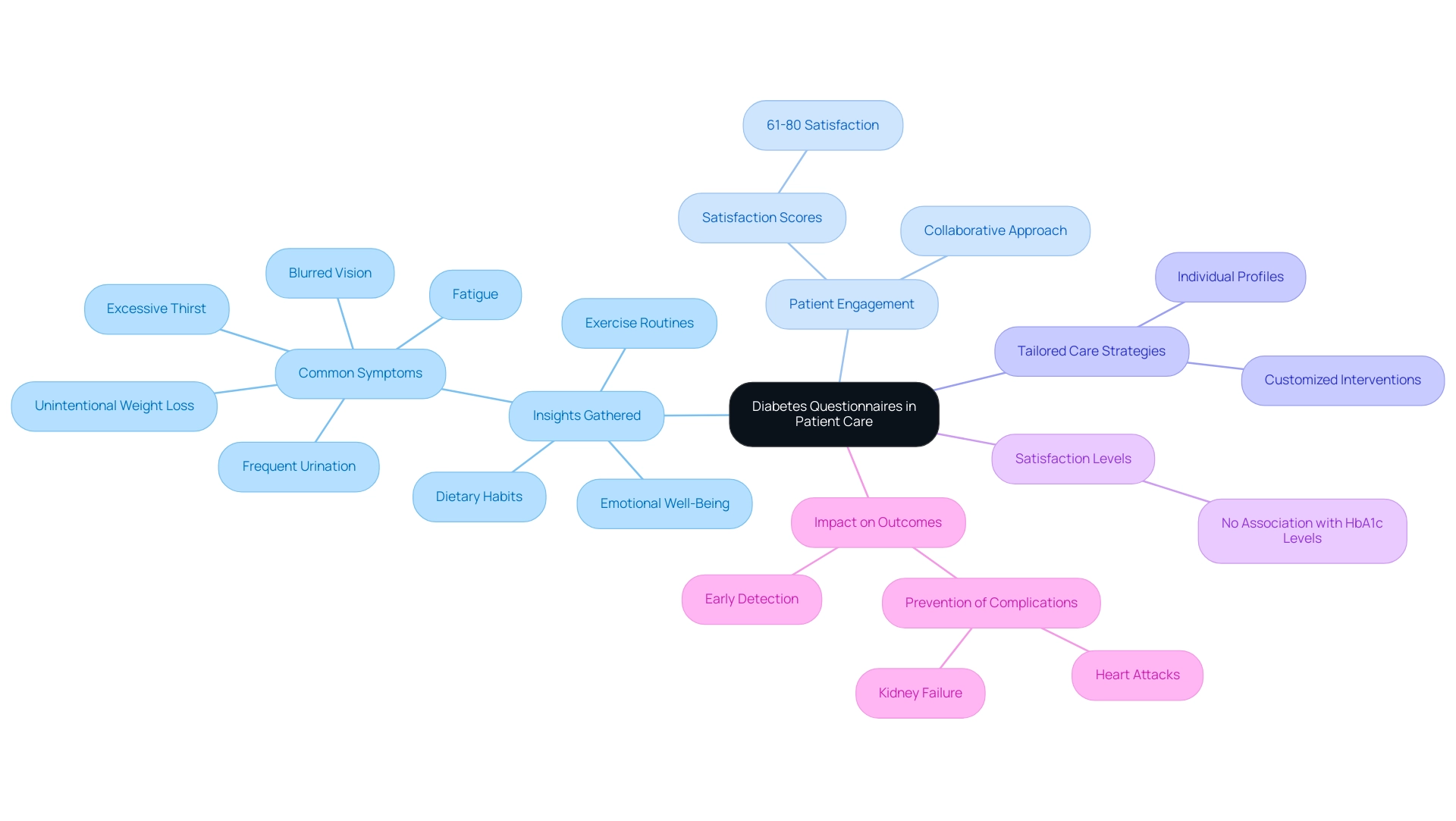
Types of Diabetes Questionnaires: An Overview
Diabetes oversight involves a thoughtful diabetes questionnaire, each designed to address specific aspects of care and self-regulation. At A2D Solutions, a new resource hub dedicated to managing blood sugar, we recognize the importance of these tools in empowering individuals on their journey. Here’s an overview of the most commonly used types:
-
Diabetes Self-Management Questionnaire (DSMQ): This tool emphasizes self-care activities essential for maintaining glycemic control. Research shows that the DSMQ has a significant negative correlation with HbA1c levels of -0.40 (p < 0.001), indicating its effectiveness in guiding patients toward better management practices.
-
Problem Areas in Diabetes Questionnaire (PAID): This questionnaire assesses the emotional distress individuals may face while managing their condition. Acknowledging these emotional challenges is vital for comprehensive care, as mental health plays a crucial role in overall management.
-
Diabetes Knowledge Questionnaire (DKQ): The DKQ evaluates an individual’s understanding of the condition and its management techniques. By identifying knowledge gaps, healthcare providers can tailor educational interventions to enhance comprehension and self-efficacy.
-
Diabetes Treatment Satisfaction Questionnaire (DTSQ): This tool measures individual satisfaction with their treatment regimen. Higher satisfaction levels are often associated with better adherence and improved health outcomes, making this survey an essential feedback element from individuals.
-
Diabetes Attitude Scale (DAS): The DAS assesses individuals' perspectives on chronic condition treatment and care. Positive attitudes are linked to proactive engagement, which can lead to better health results.
These diabetes questionnaires not only help identify areas for improvement but also offer valuable insights into individuals' experiences. For instance, the National Diabetes Statistics Report highlights that Type 2 diabetes accounts for 90% to 95% of cases, underscoring the need for effective self-management resources tailored for this group.
As T2DSolutions evolves, we will place greater emphasis on utilizing the diabetes questionnaire, as it is vital for enhancing care for individuals with this condition. Experts in blood sugar control advocate for the integration of these tools into standard care, emphasizing their ability to empower patients and improve health outcomes. By fostering a collaborative approach to health oversight, these surveys contribute to creating a supportive community where shared knowledge leads to enhanced well-being for all.
You're not alone in this journey, and we are here to support you every step of the way.
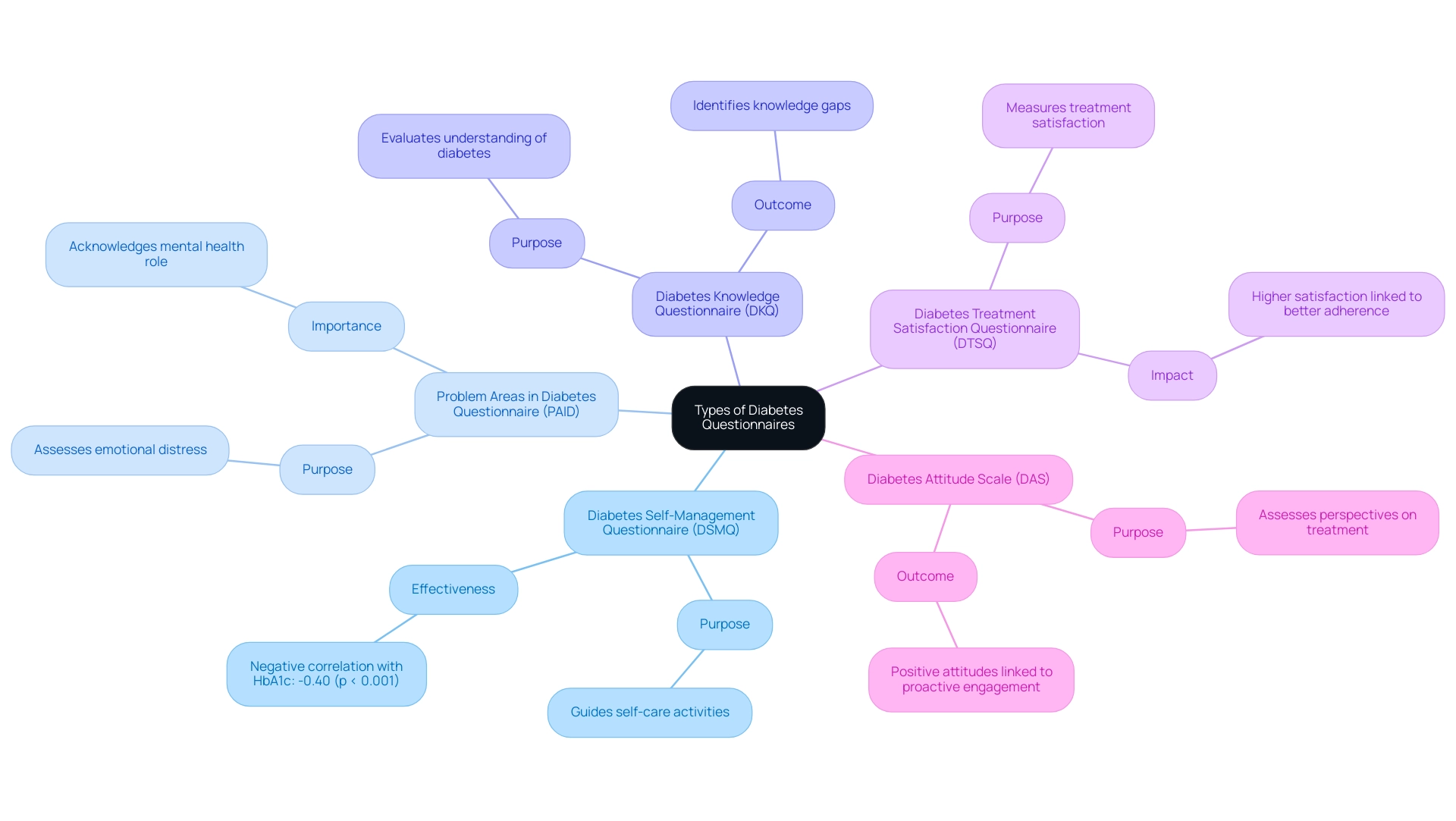
Importance of Accurate Data Collection in Diabetes Management
Atd Solutions recognizes that accurate data collection through diabetes questionnaires is vital for effectively managing this condition. This process allows healthcare providers to:
- Identify trends in a patient's blood sugar levels and lifestyle choices, revealing patterns that can inform treatment decisions.
- Tailor treatment plans to meet individual needs and preferences, ensuring a personalized approach to care.
- Monitor the effectiveness of interventions over time, allowing for adjustments based on real-time feedback.
- Address emerging issues promptly, such as complications or emotional distress, which can significantly impact an individual's overall health.
For instance, if someone frequently reports hypoglycemic episodes, they can be closely monitored. This enables healthcare providers to offer targeted education and interventions to prevent future occurrences. Such a proactive approach not only enhances patient safety but also contributes to improved health outcomes.
The importance of precise data gathering is underscored by recent research, including a study that explores the relationship between obesity, fast food consumption, and the onset of Type 2 diabetes. This study highlights that a diet high in sugar and fat significantly increases the risk of developing this condition, especially among individuals who are already obese, emphasizing the need for dietary interventions as part of prevention strategies.
Moreover, expert insights reveal that factors such as age, dietary habits, and lifestyle choices are statistically significant in managing this condition. Hafiz M R Khan from the Department of Public Health at Texas Tech University Health Sciences Center noted, "Our findings suggest that four variables—age, total protein (g/dL), time spent eating fast food (in hours), and direct HDL (mg/dL)—were statistically significant using the logistic regression model." By leveraging data collected through the diabetes questionnaire, healthcare providers can gain a comprehensive view of an individual's health, leading to more effective treatment plans.
In summary, integrating precise data gathering into care at T2DSolutions not only enhances treatment strategies but also fosters a collaborative environment where shared knowledge and support can lead to improved health outcomes for individuals. We encourage those recently diagnosed to sign up for updates on new materials related to blood sugar control and education through T2D Solutions. Remember, you're not alone in this journey; we are here to support you every step of the way.
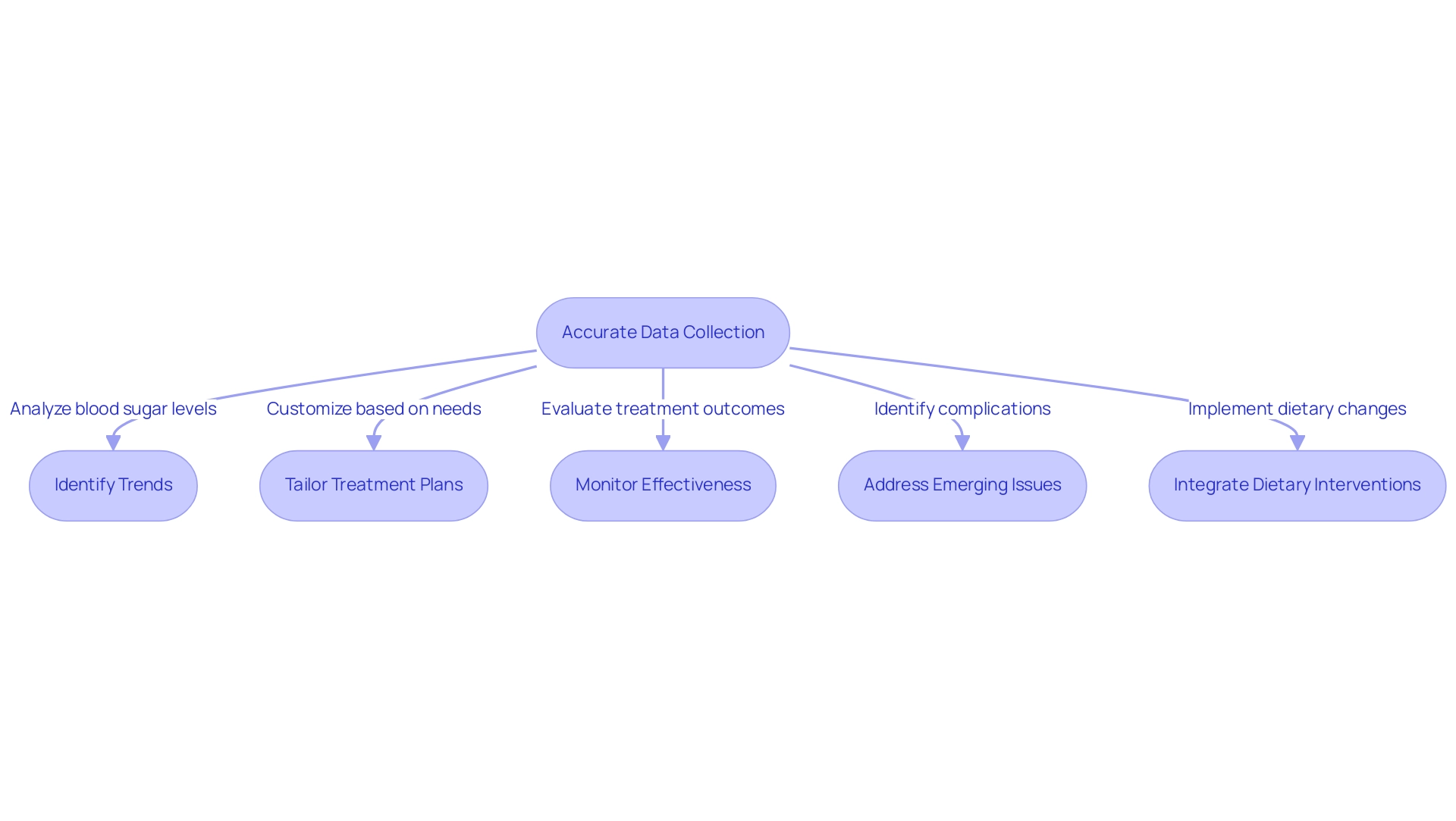
Administering Diabetes Questionnaires: Best Practices for Healthcare Providers
To effectively administer diabetes questionnaires, healthcare providers should embrace best practices that resonate with the resources available at T2DSolutions.
-
Create a Comfortable Environment: Establishing a welcoming atmosphere is crucial. When individuals feel at ease, they are more likely to provide honest and accurate responses, which is essential for effective diabetes management. Research shows that individual comfort significantly affects the precision of survey responses, emphasizing the necessity for providers to prioritize a supportive approach. T2DSolutions aims to provide resources that help create such environments.
-
Explain the Purpose of the Diabetes Questionnaire: Clearly articulating the significance of the questionnaire is vital. Patients should understand how their responses will contribute to their care, fostering a sense of involvement in their health journey. T2DSolutions offers educational materials that can assist providers in communicating this effectively.
-
Use Clear Language: Employing straightforward language and avoiding medical jargon ensures that individuals fully comprehend the diabetes questionnaire, which is vital for accurate data collection. The correlation between DKQ-R scores and education level underscores the importance of clear communication in enhancing understanding. T2DSolutions provides tools to help simplify complex medical terminology for improved understanding.
-
Encourage Open Dialogue: Facilitating an environment where individuals feel comfortable asking questions and voicing concerns is essential. This collaborative approach not only enhances communication but also builds trust between individuals and providers. As Mark Arnold noted, "Nobody who qualifies for authorship has been omitted from the list," emphasizing the importance of collaboration in managing diabetes-related care. T2DSolutions promotes open dialogue through community support initiatives.
-
Follow Up: After the questionnaire is completed, taking the time to review the responses with the individual is important. This step clarifies any misunderstandings and discusses the next steps in their care plan. Case studies have demonstrated that effective communication during this process can result in improved patient satisfaction and involvement in their health care. T2DSolutions encourages follow-up practices through its resource offerings.
Implementing these practices not only improves the quality of data collected from the diabetes questionnaire but also strengthens the patient-provider relationship, ultimately leading to better health outcomes. Moreover, the financial consequences of efficient control of blood sugar conditions are substantial, with additional medical expenses per individual linked to such conditions rising from $10,179 to $12,022 between 2012 and 2022. This emphasizes the significance of dependable testing techniques, such as those covered in the case study on the traceability of HbA1c assay methods, which aid in improving care and oversight.
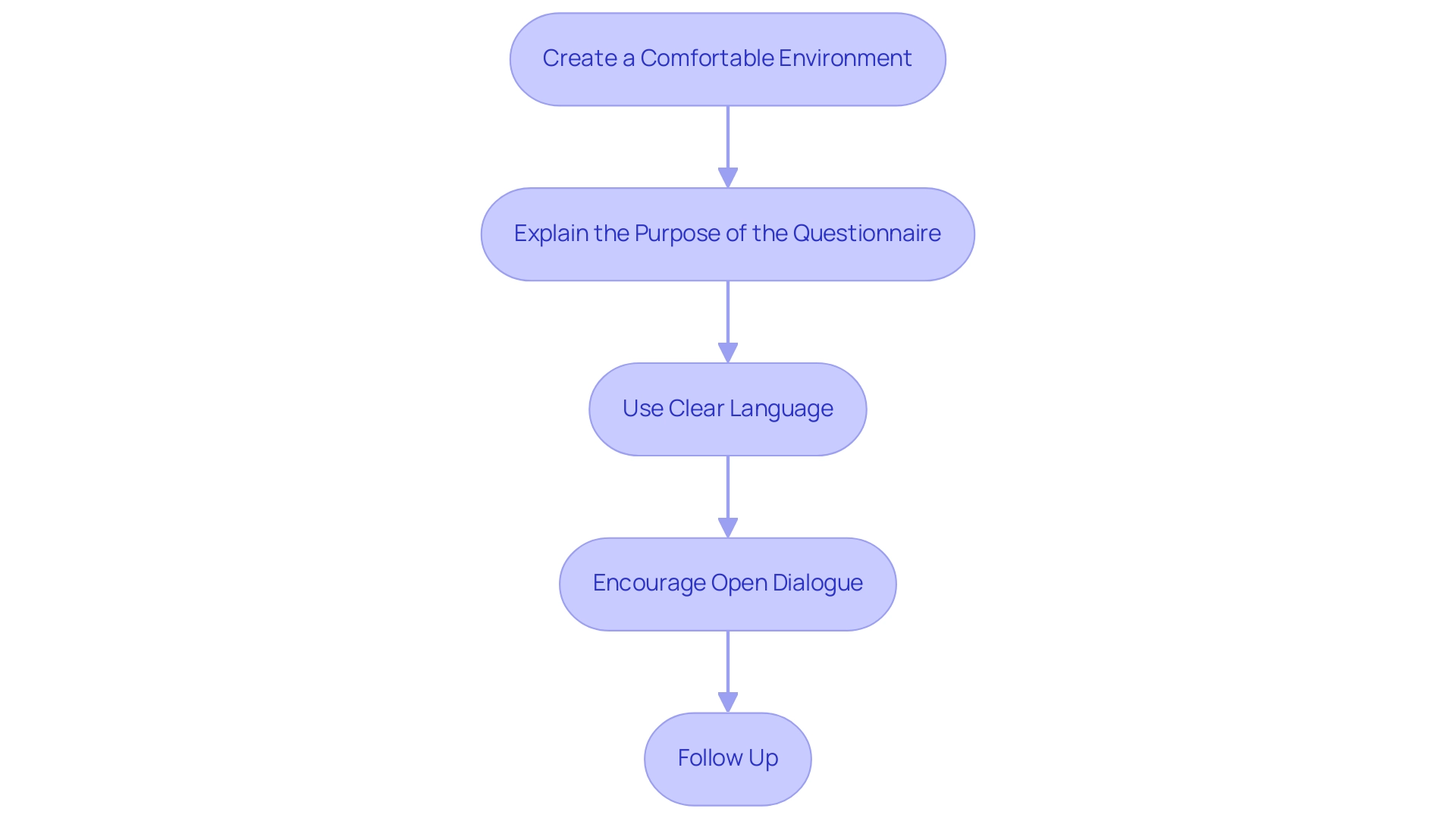
Interpreting Questionnaire Results: Empowering Patients
Interpreting the results of the diabetes questionnaire is a crucial step in helping you take charge of your health care. Engaging with these findings can significantly influence your health outcomes. Research shows a positive relationship between optimal self-care practices and patient-centered care in Type 2 conditions. Cheryl Pritlove from the Applied Health Research Center emphasizes that "studies will be analyzed through descriptive numerical summary and content analysis," highlighting the importance of thoroughly examining results.
As you navigate your health journey, consider these supportive steps:
- Review Results with Healthcare Providers: Discussing your results with healthcare providers can clarify uncertainties and provide essential context for the findings. This collaborative approach fosters a deeper understanding of your unique health needs.
- Identify Areas for Improvement: By pinpointing specific areas to focus on—such as dietary adjustments or increasing physical activity—you can tailor your self-management strategies effectively. This targeted approach is vital for enhancing your overall health.
- Set Realistic Goals: Based on your results, collaborate with your provider to establish achievable health goals. This process not only encourages your motivation but also instills a sense of responsibility, which is essential for sustained involvement in your health oversight.
- Monitor Progress: Regularly reviewing your diabetes questionnaire results over time enables you to track your progress and make necessary adjustments to your strategies. This ongoing evaluation is key to maintaining momentum in your health journey.
As T2DSolutions launches as a new resource hub for health education and oversight, it will provide valuable tools and information to support these strategies. You can subscribe to stay informed about new content and resources that will enhance your understanding and management of the condition. The case study titled "Conclusions on Person-Centered Care" confirms a positive relationship between optimal self-care behaviors and shared decision-making (SDM) in individuals with Type 2, emphasizing the significance of individual-centered care and the use of tailored health education materials.
By actively engaging with your outcomes and utilizing the resources available through T2DSolutions, you can significantly enhance your self-efficacy and commitment to managing your condition. The importance of discussing these results with your healthcare providers cannot be overstated, as it ensures that you receive tailored advice and support, ultimately leading to improved health outcomes. Moreover, recognizing the diversity of individuals in healthcare interventions is essential for customizing self-management strategies to meet unique requirements, further improving the effectiveness of managing blood sugar conditions.
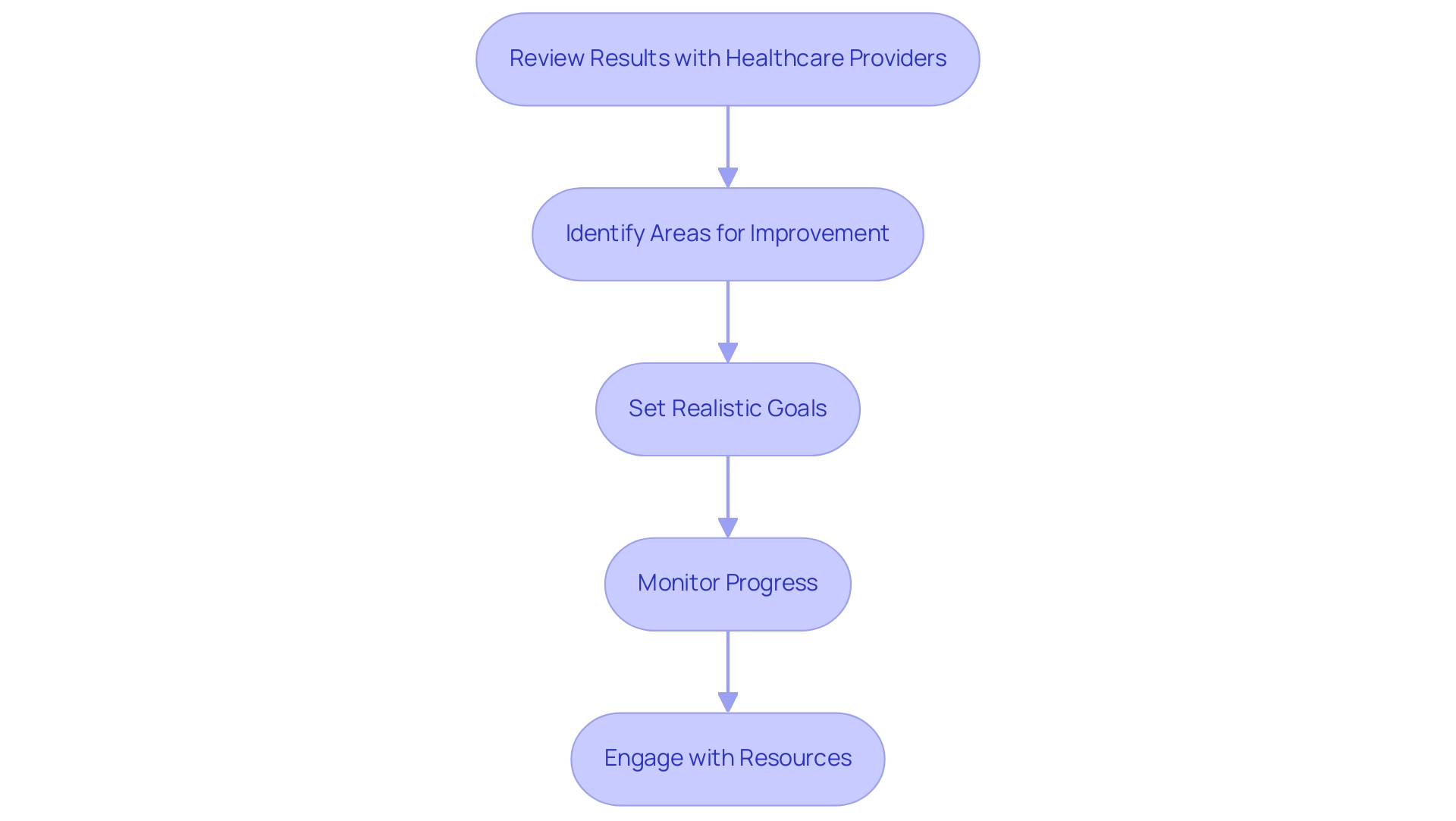
Challenges and Limitations of Diabetes Questionnaires
While diabetes questionnaires are valuable tools in patient care, it's important to recognize the challenges and limitations they present:
-
Response Bias: It's understandable to feel concerned about how patients might provide socially desirable answers instead of candid responses. This tendency can lead to skewed data, ultimately affecting the reliability of the information gathered. Studies indicate that response bias can significantly impact the accuracy of self-reported data, with some estimates suggesting that up to 30% of responses may be influenced by this bias. This highlights the need for careful analysis of diabetes questionnaire outcomes to ensure they truly reflect the genuine experiences of individuals.
-
Cultural Sensitivity: Many existing diabetes surveys may not resonate with all cultural groups, which can lead to misunderstandings and misinterpretations of the data. This underscores the necessity for culturally tailored diabetes questionnaires that ensure all individuals feel represented and understood. At T2DSolutions, we are dedicated to creating resources that address these cultural considerations in managing diabetes.
-
Limited Scope: It's crucial to acknowledge that questionnaires often fail to capture the full complexity of an individual's experience with diabetes. They may overlook critical qualitative data that could provide deeper insights into individual challenges and needs. For instance, a case study examining the limitations of standard questionnaires found that individuals expressed feelings and experiences that were not addressed by the questions posed, indicating a gap in understanding their unique situations. This limitation emphasizes the importance of integrating qualitative assessments alongside quantitative measures, a focus that T2DSolutions aims to incorporate in future diabetes questionnaire offerings.
-
Over-reliance on Self-Report: Self-reported data can be inherently inaccurate, as patients may struggle to remember or disclose their behaviors accurately. This limitation is particularly pronounced in diabetes care, where precise tracking of dietary habits, medication adherence, and physical activity is crucial. Research has shown that discrepancies between self-reported behaviors and actual practices can lead to suboptimal results. The validation of tools like the Diabetes Self-Management Questionnaire (DSMQ-R) supports the need for reliable assessment methods. As Andreas Schmitt from the Research Institute of the Diabetes Academy Mergentheim noted, "The results support good clinimetric properties of the DSMQ-R."
Recognizing these limitations is essential for both patients and healthcare providers. By understanding the challenges linked to health surveys, we can use them as part of a broader strategy for managing health issues, ensuring that the insights obtained are both precise and applicable. Moreover, cultivating a sense of community and teamwork among individuals and healthcare providers can enhance the effectiveness of these tools, aligning with T2DSolutions' mission to empower people in their health management journey. You're not alone in this journey, and together, we can navigate these challenges with compassion and understanding.
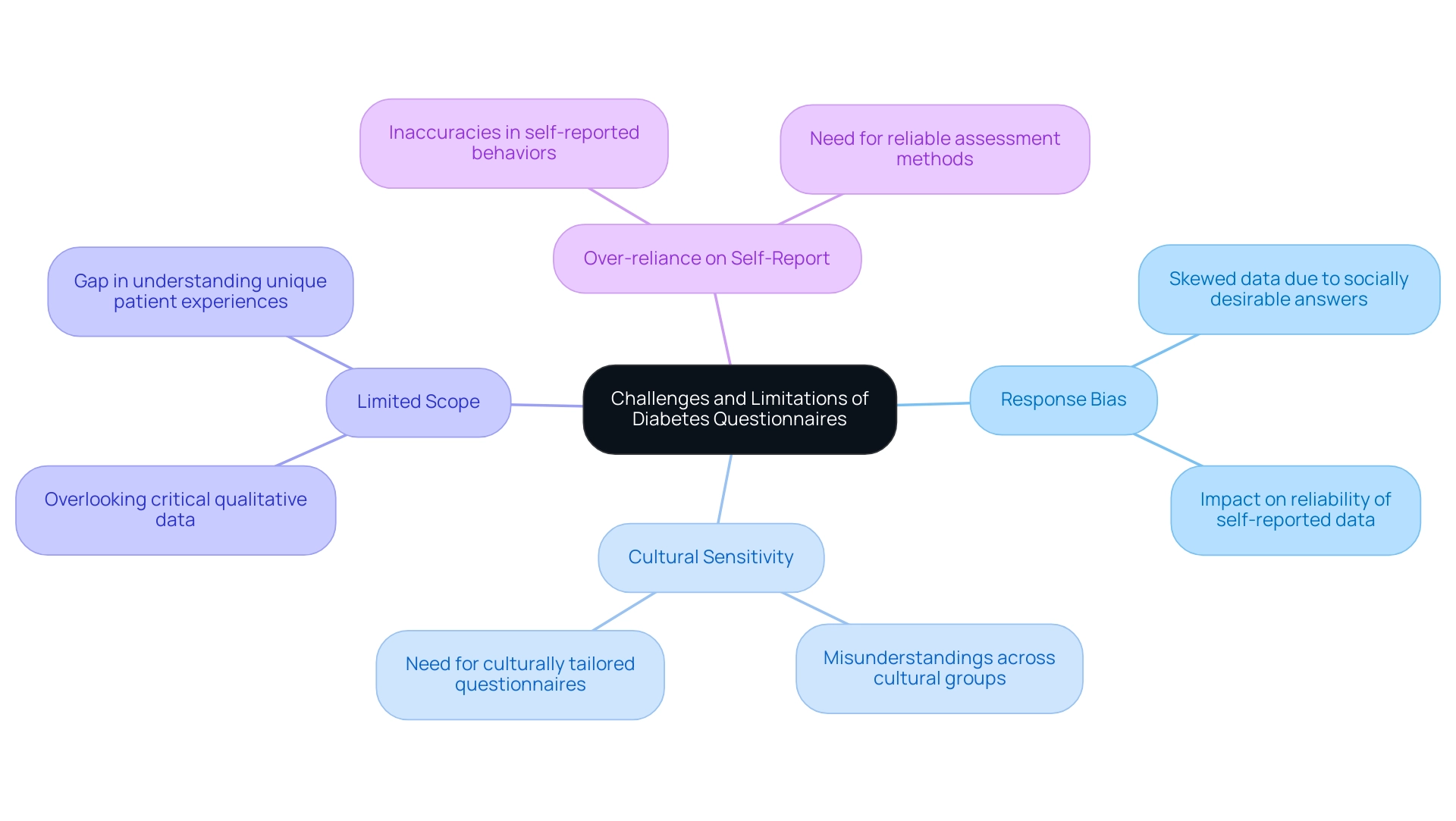
The Future of Diabetes Questionnaires: Innovations and Trends
The outlook for health assessments is truly optimistic, filled with numerous important innovations and trends designed to enhance care for everyone involved.
-
Digital Integration: A significant change is underway as many assessments transition to digital platforms. This shift allows for real-time data gathering and analysis, streamlining the process for both individuals and healthcare providers. Recent findings from a diabetes questionnaire reveal that integrated digital health platforms significantly improve health outcomes for those living with diabetes. For example, a study showed a decrease in fasting plasma glucose (FPG) from baseline to 48 weeks in group C, which was notably higher than in group B.
-
Personalization: Looking ahead, future iterations of these surveys are expected to harness machine learning algorithms, enabling them to customize questions based on individual profiles and previous responses. This level of personalization can lead to more relevant and effective evaluations, ensuring that your unique needs are addressed.
-
Enhanced Engagement: The introduction of interactive questionnaires that provide immediate feedback is set to elevate your involvement in care. By actively engaging patients, these tools foster a sense of ownership over your health journey.
-
Focus on Holistic Health: Emerging tools are being developed to assess not only blood sugar control but also mental well-being and lifestyle factors. This holistic approach acknowledges the interconnectedness of physical and mental wellness, paving the way for more comprehensive care strategies.
These advancements are not just theoretical; they are supported by recent discoveries showing that integrated digital health platforms, when paired with a diabetes questionnaire, greatly enhance outcomes in managing blood sugar conditions. For instance, a study focusing on an AI-based dietary management platform found that participants who utilized the platform alongside medical staff feedback experienced the most significant improvements in HbA1c levels and weight loss compared to those receiving routine care. You-Bin Lee noted that while the reduction in HbA was relatively moderate, it underscores the effectiveness of these strategies.
Such evidence illuminates the potential of digital integration in refining the accuracy and relevance of information gathered through diabetes questionnaires, ultimately leading to better outcomes for individuals. Moreover, it is crucial that technological advancements align with your knowledge as a patient for effective diabetes self-management, ensuring that these tools are user-friendly and accessible. Remember, you are not alone in this journey; we are here to support you every step of the way.
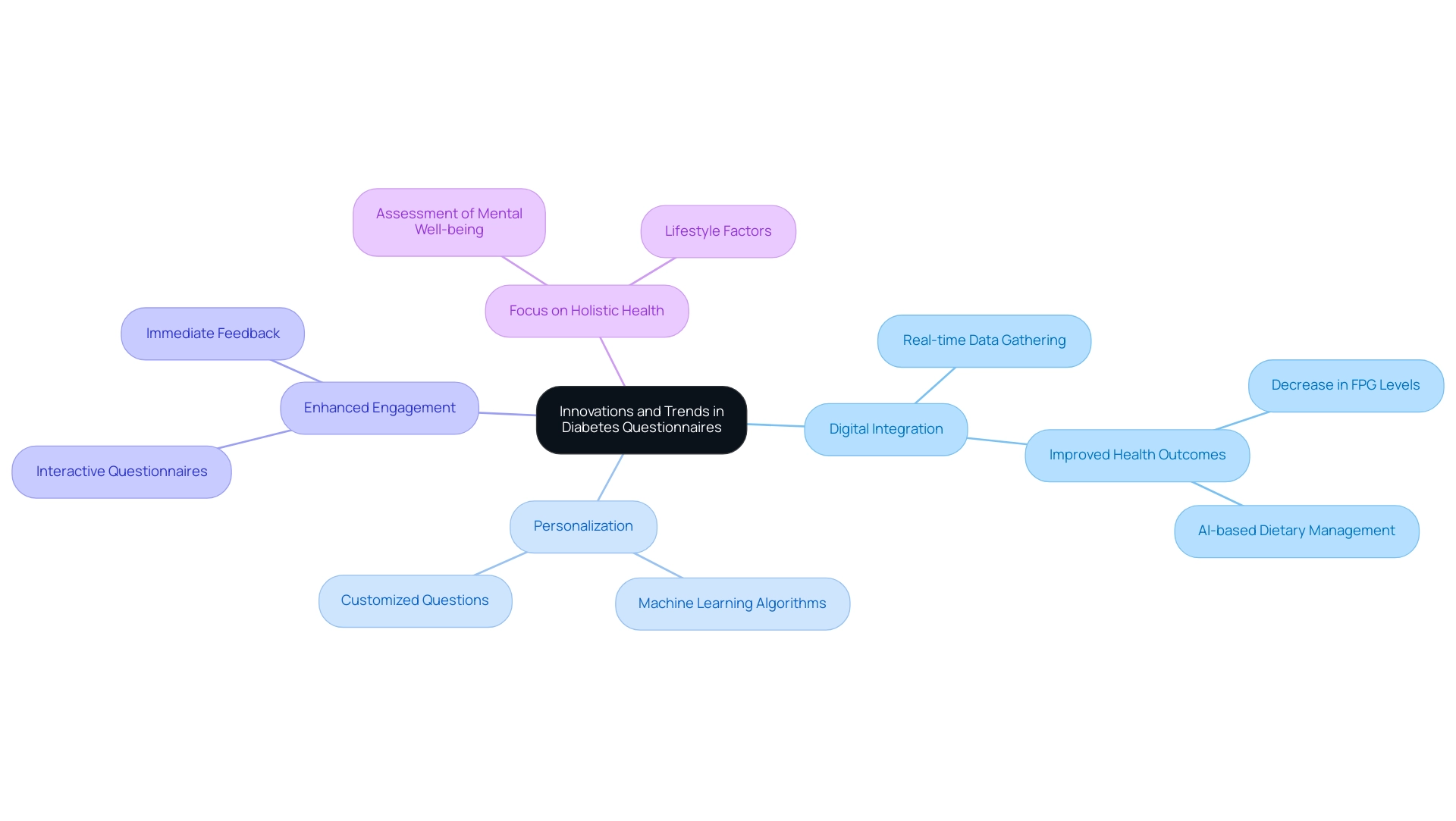
Conclusion
Diabetes questionnaires are more than just tools; they are vital in enhancing patient care by gathering essential information that informs personalized treatment plans. They empower you, the patient, to take an active role in managing your diabetes, improving your understanding of the condition and fostering better health outcomes. By identifying aspects like lifestyle choices and emotional health, these questionnaires help healthcare providers tailor interventions that meet your unique needs, ultimately creating a more engaged and informed community.
However, it's important to acknowledge the challenges that come with diabetes questionnaires, such as response bias and cultural insensitivity. Addressing these issues requires a commitment to developing more inclusive and comprehensive assessment tools that truly capture your experience. As diabetes management evolves, integrating digital platforms and personalized approaches will enhance the effectiveness of these questionnaires, making them even more valuable for your care.
In conclusion, diabetes questionnaires are not just data collection instruments; they are essential for fostering a collaborative approach to managing diabetes. By empowering you and providing healthcare providers with critical insights, these questionnaires significantly contribute to improved health outcomes. As innovations in this field continue to emerge, the potential for enhanced patient engagement and personalized care will undoubtedly grow, leading to a brighter future for all navigating the journey of diabetes management. Remember, you're not alone in this journey, and we are here to support you every step of the way.
Frequently Asked Questions
What is the purpose of diabetes surveys in healthcare?
Diabetes surveys are designed to gather comprehensive insights about an individual's health condition, lifestyle choices, and management strategies for diabetes, allowing healthcare providers to assess understanding, treatment adherence, and obstacles in managing health.
How do diabetes surveys improve patient care?
By utilizing diabetes surveys, healthcare providers can tailor their care strategies to meet the unique needs of each person, enhancing the quality of care and outcomes for those receiving treatment.
What is the reported satisfaction level of individuals using diabetes surveys?
Recent research indicates that nearly half of individuals reported satisfaction scores ranging from 61 to 80% when using these surveys, highlighting their effectiveness in fostering engagement and understanding.
Are satisfaction levels from diabetes surveys related to clinical factors like HbA1c levels?
Studies reveal no significant relationship between satisfaction levels and factors such as HbA1c levels, suggesting that the surveys themselves are pivotal in shaping patient experiences.
What additional insights do diabetes surveys provide?
Diabetes surveys offer vital insights into various aspects of a patient’s life, including dietary habits, exercise routines, and emotional well-being, which are crucial for effective management.
How can diabetes surveys help in early detection of complications?
By identifying common symptoms of diabetes through targeted surveys, healthcare providers can intervene promptly, potentially preventing serious complications like heart attacks or kidney failure.
What types of diabetes questionnaires are commonly used?
Commonly used diabetes questionnaires include the Diabetes Self-Management Questionnaire (DSMQ), Problem Areas in Diabetes Questionnaire (PAID), Diabetes Knowledge Questionnaire (DKQ), Diabetes Treatment Satisfaction Questionnaire (DTSQ), and Diabetes Attitude Scale (DAS).
What is the significance of the Diabetes Self-Management Questionnaire (DSMQ)?
The DSMQ emphasizes self-care activities essential for maintaining glycemic control and has a significant negative correlation with HbA1c levels, indicating its effectiveness in guiding patients toward better management practices.
How does the Problem Areas in Diabetes Questionnaire (PAID) contribute to diabetes care?
The PAID assesses the emotional distress individuals may face while managing their condition, which is vital for comprehensive care since mental health plays a crucial role in overall management.
Why is the Diabetes Knowledge Questionnaire (DKQ) important?
The DKQ evaluates an individual’s understanding of diabetes and its management techniques, helping healthcare providers identify knowledge gaps to tailor educational interventions.
What role does the Diabetes Treatment Satisfaction Questionnaire (DTSQ) play in diabetes management?
The DTSQ measures individual satisfaction with their treatment regimen, with higher satisfaction levels often associated with better adherence and improved health outcomes.
How does the Diabetes Attitude Scale (DAS) impact patient engagement?
The DAS assesses individuals' perspectives on chronic condition treatment and care, with positive attitudes linked to proactive engagement that can lead to better health results.
What is the overarching goal of utilizing diabetes questionnaires in patient care?
The goal is to enhance care for individuals with diabetes by integrating these tools into standard care, empowering patients, and improving health outcomes through a collaborative approach.
